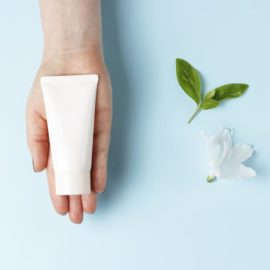Clean beauty is a key trend in cosmetics, but one that is difficult to define. ‘Clean’ can mean natural; it can mean safe; it can mean sustainable; or a combination of all these claims. Despite the instability of the term, it’s prominence is exploding: on social media, mentions of ‘clean beauty’ have increased by 29,000% in the last five years. And yet, clean beauty certifications in cosmetics are still in their infancy.
The cosmetic certifications that do exist are linked to the clean food movement and are the result of a number of actions that ultimately seek to make companies use fewer ingredients, while including more natural products. Clean beauty is increasingly about ingredient transparency and a clear line of communication with consumers.
Thus, the clean beauty trend, partially boosted by influencer and blogger culture, is associated with consumers’ perception that their is a lack of transparency in the beauty industry. There is suspicion that companies are adding unnecessary synthetic ingredients that could be unsafe both for humans and for the environment; in other words, clean-beauty consumers demand products with shorter ingredient lists and which are mainly derived from natural sources.
Content
The Credo Clean Standard
Of the clean beauty certifications in cosmetics that do exist, the Credo Clean Standard is one of the most comprehensive. The Credo Clean Standard encourages brands to be transparent about their products’ safety, sourcing, ethics, and sustainability in order to obtain the label. The Standard aims to provide a specific definition of clean beauty by taking several measures:
- The standard has created a 2,700 item ingredient list (the Dirty List) that companies must avoid for safety and sustainability reasons.
- Brands must obtain and disclose information about their components’ composition and sourcing.
- Companies must test their products for safety on voluntary humans.
- The certification encourages official ingredient terminology and ingredient source codes, as well as fragrance transparency.
With these guidelines, the Credo Clean Standard aims to make clean quantifiable. With this mark, consumers can buy clean products with confidence, safe in the knowledge that ingredients are safe, ethically sourced, and environmentally friendly.
Provital’s commitment to clean beauty certifications in cosmetics
Clean beauty certifications in cosmetics typically demand ingredient transparency from brands, while also providing lists that discourage the use of certain ingredients perceived as unsafe or unsustainable. Although the field of clean beauty certifications is still going, Provital is committed to ensuring the movement has momentum.
Provital develops natural active ingredients and extracts that are not only effective, but also meet with consumers’ demands for natural, organic and sustainable beauty – that is, the demand for clean. This ethical imperative extends to our corporate conduct. We want to take care of the environment and the people and communities we work with.
In order to do so, we know that actions must be taken: we must move forward and develop innovative products while assuring our supply chain is both ethical and sustainable. The clean concept is an important part of this objective, and thus, one that should continue to be more clearly defined by the industry.
No comments yet
There are no comments on this post yet.





Leave a comment